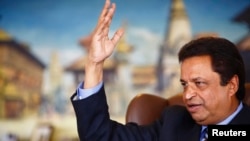Nepal’s first and only billionaire has promised to help rebuild homes and schools following the devastating earthquake in his homeland.
Binod Chaudhary, chairman of CG Corp. Global and Chaudhary Group Nepal, spoke with VOA on Thursday about the immense challenges his country is facing and what he’s doing to help.
“It’s been perhaps one of the most challenging times ever in the history of Nepal,” he said.
Chaudhary Group is a conglomerate based in Kathmandu that consists of almost 80 businesses and has annual revenues of over $800 million.
In addition to being one of the 1,500 richest people in the world, Chaudhary is also a proud Nepali who recognized an opportunity to help his country.
“Our hope is that very quickly we’ll be able to find the right partners who will support us in doing jointly the 10,000-home target that we’ve set for ourselves, and hopefully much more than 100 schools that we’re planning to restore,” said Chaudhary.
Chaudhary said Pricewaterhouse Foundation, SEEDS India, Tata Group and Ali Baba Group are among the confirmed partners.
Earthquake realities
The United Nations says 8 million people — more than one quarter of Nepal's population — have been affected by the disaster.
Keshav Koirala, a digital editor for the Himalayan Times, was in his apartment with his family when the earthquake struck.
“Everybody started to panic,” he said. “The earthquake did not stop for more than 30 or 40 seconds, and I then felt that it was not a small quake.”
His sister was holding his 7-month-old nephew as the building continued to shake.
“I took the baby from my sister’s arms, and I took him under the sofa, thinking that even if the house collapsed, he would be safe,” he said. “It was like a nightmare.”
Despite their terrifying experience, Keshav and his family were some of the lucky ones. His house did not collapse, and all of his family survived.
But a boarding school in Kathmandu is no longer standing.
“We had just had lunch and we were coming out of our dining hall, and suddenly the whole building started to shake," Principal Ojesh Bajracharya said. "So we all gathered our students and we all lay down with our heads down in the playground. Luckily, we were all outside at the time, so everybody was safe.”
Two of the school's five buildings remained intact.
The 70 students who were living at the school have been forced to make other living arrangements. The school's 540 students still do not know when they will be able return to class.
“I have applied in the city office for the government to come and see my school, but I’ve been just told that right now it’s not in their priority. ... I don't know what to do," Bajracharya said.
The Nepalese government has estimated that over 600 schools and roughly 300,000 houses were damaged or destroyed during the earthquake.
Chaudhary response
Chaudhary Group was one of the first to mobilize efforts on the ground in Kathmandu following the earthquake.
“We converted most of our schools in Kathmandu into relief camps as soon as the earthquake happened on the 25th. And then we started doing what we could in terms of taking food, water, drinks and medicine and medical support systems to many different parts of the country,” Chaudhary said.
Koirala said that Chaudhary’s initiatives were welcomed, but that he hoped other corporations and wealthy individuals around the world would follow his example.
“It’s not a job that a single person can do,” Koirala said. “Every individual should contribute from their portion in whatever they can do.”
Chaudhary agreed: “These are situations where all the resources need to be put together, whether it’s government, private, IGO, NGO, international,” he said.
Earthquake chapters
In 2010, Chaudhary was in Chile with his wife when the sixth-largest earthquake in history struck the South American nation.
“My destiny seems to be getting, one way or other, involved with earthquakes of this magnitude,” Chaudhary said.
Kiran Shrestha, a publisher at Nepalaya Production House who worked on Chaudhary’s autobiography, said the Chilean earthquake had a profound effect on him.
“He encountered how uncertain life can be with money and everything,” he said.
“It was like waiting for te death right in front of your eyes, which was almost imminent," Chaudhary said about the experience. "And having survived that, I think, opens a completely new chapter in your life.”
The newest chapter of Chaudhary’s life is Nepal: “Ultimately our identity is Nepal,” he said. “We owe everything that we have to Nepal, and we thought these are the times where we need to do whatever we can. I’m prepared to put in whatever best we can, both in terms of our own managerial capability, our own time, effort, as well as money, as well as our network of friends and resources that we can mobilize for addressing the problems of the country.”
Chaudhary hopes to complete at least 1,000 temporary homes, fully funded by Chaudhary Group, within six months.




